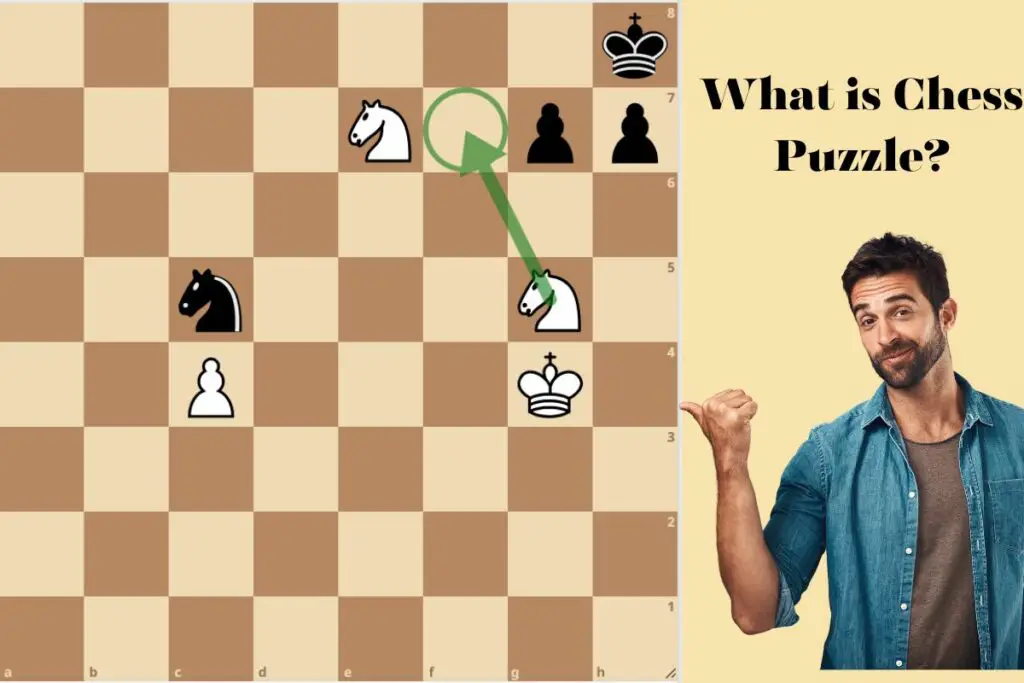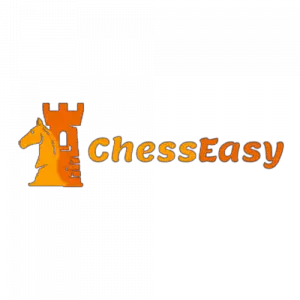
Chess puzzles are just the most well-known secret in the chess world. I mean, who hasn’t heard about them in every single YouTube video or article about getting better at chess? What are they, though?
Chess puzzles, also known as chess tactics or chess problems, are brief, specialized chess positions or scenarios in which the player must select the best move or series of moves to accomplish a certain goal. It helps players develop their chess skills overall.
It’s ideal to do 20-30 puzzles per day to improve your calculation and tactical skill.
So, whether you’re a grandmaster in the making or just curious about the chessboard’s secrets, this post is for you!
What Are Chess Puzzles?
Chess puzzles are designed to help chess players improve their tactical skills, sharpen their calculation abilities, and enhance their overall chess strategy. They are known to be a valuable tool for beginners and experienced players to practice and refine their chess skills.
Why Are Chess Puzzles Important for Chess Players?
Chess is all about challenging your mind, isn’t it? That’s why chess puzzles are like mind workouts for chess players. Here are some specific reasons why those puzzles are absolutely important to you as a chess player:
Tactical Skill Development
Chess puzzles are a great way to hone and strengthen your tactical abilities. Players must be able to recognize and use tactical patterns like double attacks, discovered attacks, forks, and skewers.
Since chess is a pattern recognition game, developing tactical abilities is essential for identifying winning combinations in live games.
Calculation Abilities
Chess puzzle movements and placements must be properly calculated. The repercussions of each move must be considered, along with different move combinations and their opponent’s possible responses. Want to increase the precision and effectiveness of your in-game analysis? Calculation practice is the route to take.
Pattern Recognition
Pattern recognition is improved by exposure to numerous puzzle types repeatedly. Players improve with time in quickly recognizing tactical themes and locations, which makes it easier for them to recognize chances and threats in their games.
Positional Understanding
These puzzles concentrate on important positional themes, which might assist players in comprehending chess strategy and fundamentals better. Concepts like piece activity, pawn structure, piece coordination, and the significance of the center can all be reinforced by puzzles.
Improved Concentration and Focus
Chess puzzles take a great deal of focus and concentration. Puzzles assist players in developing the mental discipline necessary to maintain focus over long and challenging games, which lowers the possibility of mistakes brought on by oversight or distraction.
Confidence Building
A player’s confidence is increased and their sense of accomplishment is increased when they successfully solve a problem. This assurance can result in increased self-assurance during competitions, which improves decision-making under pressure.
Preparation for Real Games
Chess puzzles frequently reflect the situations and strategies that can be used in real games. Players’ chances of success increase by completing puzzles because they are better equipped to deal with comparable scenarios that may happen in their games.
Overcoming Weaknesses
Chess puzzles can help a player improve on particular areas of weakness. For instance, if a person has trouble with endgame problems, they can focus on them to get better at endgames overall.
Continuous Improvement
Chess is a game that requires constant study and development. Players can continuously challenge themselves with puzzles, which helps them develop their skills. Puzzle-solving is beneficial for players of all experience levels, from novices to grandmasters.
Enjoyment and Engagement
For many chess players, solving problems is a fun and interesting part of the game. It makes practicing chess more enjoyable and can help players stay motivated and enthusiastic about it.
What Are the Types of Chess Puzzles?
There are different kinds of chess puzzles, and each one is designed to test your skills and understanding of the game. Want to learn more about a few common chess puzzle categories? I’ve listed 12 below:
- Mate in X Puzzles: The goal of these puzzles is to checkmate your opponent’s king in a predetermined number of moves, or “Mate in X,” where X is the number of moves needed to achieve checkmate. You can develop your checkmate techniques and learn how to deliver checkmate effectively by solving these puzzles.
- Winning Material Puzzles: Finding a series of movements that enables you to capture your opponent’s pieces and obtain a material advantage, such as winning a queen or rook, is the purpose of these puzzles. Your ability to recognize tactical possibilities to acquire material is improved by these puzzles.
- Stalemate or Draw Puzzles: These puzzles test your ability to use your deficit to your advantage to force a draw or stalemate. You can learn the practical aspects of drawing games and defending challenging positions by completing these tasks.
- Tactics Puzzles: Combinations of moves that take advantage of weaknesses in your opponent’s positioning make up tactical puzzles. These include strategies like double attacks, discovered attacks, and fork, fork, and skewer attacks. Your ability to generate threats and locate tactical resources in your games develops as a result of solving tactics puzzles.
- Defense Puzzles: You must determine the optimal defensive maneuver in these puzzles to prevent losing resources or being checkmated. Defense puzzles help with the growth of your capacity to effectively fight off threats from your opponent.
- Opening and Middle-Game Puzzles: These focus on particular opening and middle-game patterns, positions or concepts. They could put you to the test by asking you to determine the best move to develop your pieces, control the center, or carry out a certain strategy in a specific opening.
- Endgame Puzzles: Endgame puzzles focus on the positions and strategies used in the game’s final stages. Finding the best move to advance a pawn, carrying out a winning strategy in a specific endgame, or securing a draw in a difficult endgame are some examples.
- Checkmate-in-One Puzzles: These games are meant to help you become more adept at delivering checkmates with just one move. Despite their apparent simplicity, they help beginners in becoming more accustomed to the basic checkmating patterns.
- Two-Move Checkmate Puzzles: These puzzles concentrate on achieving a checkmate in two moves, similar to checkmate-in-one puzzles. They frequently include fast tactical combinations and well-known openings.
- Three-Move Checkmate Puzzles: These problems take a little more thought and execution than the previous two kinds as you must checkmate your opponent’s king in three moves.
- Famous Games and Combinations: Several puzzles are based on well-known matches or notable combinations that grandmasters throughout the history of chess have played. You can study and pick up tips from the finest by resolving these puzzles.
- Constructive Puzzles: You might need to determine the appropriate move in constructive puzzles to gradually gain an advantageous position. You can learn how to build up minor advantages and turn them into a winning position by working through these puzzles.
How Can I Improve My Chess Puzzle-Solving Skills Over Time?
Improving puzzle-solving skills takes time, patience, and persistence. However, if you need specific strategies that you can incorporate into your chess training regimen, here are some of the tried-and-tested techniques you can follow:
- Pattern Recognition: Focus on recognizing common tactical patterns, such as pins, forks, skewers, discovered attacks, and double attacks. The more patterns you recognize, the faster you can spot them in games.
- Visualization: Practice visualizing the chessboard and pieces in your mind. Yes, exactly like when she did in The Queen’s Gambit. Try to play out the positions in your head, especially in longer puzzles. Don’t underestimate how that improves your overall skill.
- Calculation Skills: Work on your calculation skills by calculating variations accurately. Pay attention to forcing moves (checks, captures, threats) and evaluate the consequences of each move.
- Time Management: Practice managing your time effectively when solving puzzles. Set time limits for each puzzle to simulate real-game time pressure.
- Use Puzzle Books and Software: Chess puzzle books and software offer a wide range of puzzles and can provide instant feedback. Many chess apps and websites offer customizable puzzle-solving experiences. Recommendation coming right up!
- Solve Offline and Online Puzzles: Solve puzzles both over the board and online to adapt to different settings and time controls.
- Study Grandmaster Games: Analyze games played by top-level grandmasters to learn from their tactical combinations and maneuvers.
- Group Practice: Join chess clubs or online forums where you can discuss puzzles and solutions with fellow chess enthusiasts. Learning from others can be valuable.
- Review Old Puzzles: Periodically revisit puzzles you’ve previously solved to reinforce your understanding and retention of tactical concepts.
- Maintain a Puzzle Log: Like a diary! Keep a record of the puzzles you’ve solved, including the date, source, and success rate. Tracking your progress can be motivating.
- Simulate Game Positions: Create puzzles from your own games or positions you encounter in practice games. This helps you apply puzzle-solving skills directly to your play.
- Seek Coaching: Consider working with a chess coach or tutor who can provide personalized guidance and feedback on your puzzle-solving skills.
Where Can I Practice Chess Puzzles?
You can practice chess puzzles in a variety of places that accommodate different preferences and skill levels. There’s nothing more exciting than doing the same puzzles over and over again in different environments, right? A few well-liked choices include:
Chess Websites and Online Platforms
- Chess.com
 : Offers a wide range of chess puzzles, including tactics, endgames, and checkmate patterns.
: Offers a wide range of chess puzzles, including tactics, endgames, and checkmate patterns. - lichess.org
 : Provides free puzzles, and you can also customize the difficulty level and theme.
: Provides free puzzles, and you can also customize the difficulty level and theme. - Chess24
 : Offers a collection of puzzles and tactics to improve your chess skills.
: Offers a collection of puzzles and tactics to improve your chess skills. - Internet Chess Club (ICC)
 : Features puzzles and tactics for members to solve.
: Features puzzles and tactics for members to solve.
Chess Apps
Puzzle-solving skills are frequently found in chess apps for tablets and smartphones. I think it’s a nice way to pass time on your phone, isn’t it? If you’re willing to try, here are a few well-known chess apps with puzzles:
- Chess Tactics Pro: available on Google Play
 and App Store
and App Store .
. - Shredder Chess: available on Google Play
 and App Store
and App Store .
. - CT-ART: available on Google Play
 and App Store
and App Store .
.
Chess Books and Puzzle Books
A fan of books? No problem! Tactics and puzzles are the main topics of many chess books. Examples include “Winning  C
C hess Tactics
hess Tactics ” by Yasser Seirawan and the “1001 Brilliant Ways to Checkmate
” by Yasser Seirawan and the “1001 Brilliant Ways to Checkmate ” series. There are puzzle books for gamers of all experience levels, from absolute beginners to masters.
” series. There are puzzle books for gamers of all experience levels, from absolute beginners to masters.
Chess Clubs and Tournaments
Puzzle-solving sessions are a common feature of both offline and online chess clubs’ regular events. Club activities can be a fun way to communicate with other players and practice
